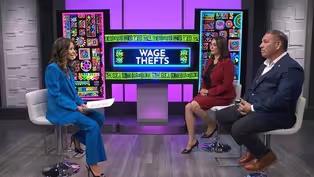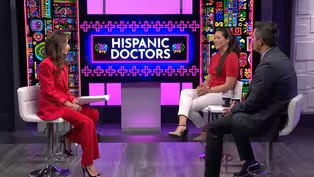
Food for Thought: Hispanic Roots and the Next Generation's Impact
Special | 19m 56sVideo has Closed Captions
Latino street vendors fight the system for independence and to provide for the next generation.
"Horizonte" explores the fight for fair labor rights within Hispanic communities. Second- and third-generation advocates push for policy reforms to address income inequality, protect food workers and support street vendors who nourish our cities. Through powerful stories and expert insights, we examine the resilience and activism shaping an equitable future for the next generation.
Problems playing video? | Closed Captioning Feedback
Problems playing video? | Closed Captioning Feedback
Horizonte is a local public television program presented by Arizona PBS

Food for Thought: Hispanic Roots and the Next Generation's Impact
Special | 19m 56sVideo has Closed Captions
"Horizonte" explores the fight for fair labor rights within Hispanic communities. Second- and third-generation advocates push for policy reforms to address income inequality, protect food workers and support street vendors who nourish our cities. Through powerful stories and expert insights, we examine the resilience and activism shaping an equitable future for the next generation.
Problems playing video? | Closed Captioning Feedback
How to Watch Horizonte
Horizonte is available to stream on pbs.org and the free PBS App, available on iPhone, Apple TV, Android TV, Android smartphones, Amazon Fire TV, Amazon Fire Tablet, Roku, Samsung Smart TV, and Vizio.
Providing Support for PBS.org
Learn Moreabout PBS online sponsorshipMore from This Collection
From health care disparities to the true cost of a car wash, "Horizonte" examines issues of particular interest to Arizona’s Hispanic community. In partnership with WorkingNation and made possible thanks to the generosity of Lumina Foundation, these specials
The Fight for Puerto Rico's Recovery
Video has Closed Captions
Puerto Ricans tackle hurricanes and energy woes with grassroots farming and renewables. (20m 32s)
Gentrification and cultural resilience in Latino communities
Video has Closed Captions
Latinos are confronting an uptick happening in major cities including Phoenix: Gentrification. (16m 17s)
'True Cost of a Car Wash' highlights Latino wage theft and economic equality
Video has Closed Captions
Examine harsh realities of wage theft and labor violations in Arizona for Latino American workers. (28m 46s)
The shortage of Latino doctors in Arizona
Video has Closed Captions
It's a frustration many Hispanics in Arizona face: Where are the Latino doctors? (28m 46s)
Providing Support for PBS.org
Learn Moreabout PBS online sponsorship(upbeat music) - Hello, I'm Catherine Anaya, and welcome to this special episode of "Horizonte."
Street vendors are more than just food carts and sidewalk stands.
They represent resilience and entrepreneurship.
For many immigrants, vending is a pathway to independence and a way to provide for their families.
Yet restrictive policies and systemic barriers make survival in this industry an uphill battle.
In New York City, a cap on mobile food vending permits has left thousands operating in legal limbo, facing fines and uncertainty.
But across the country, from the streets of New York to the neighborhoods of Arizona, advocates are stepping up to fight for change.
In the Working Nation film, "Food for Thought Hispanic Roots, and the Next Generation's Impact on NYC," we explore the intersection of struggle and opportunity in the world of street vending and the community organizations working to create a fairer future for food workers.
Watch this.
(speaker speaking in foreign language) - I was born in New York City in 1967.
My parents came to New York City in 1965 due to political unrest and extreme poverty in the Dominican Republic.
Back in those days, times were really hard.
There weren't as many Latinos as there are now.
They didn't know the language.
They left everything and everyone they loved behind and searched for a better life.
They were always working, whether it was seven days a week, you know, one, two jobs.
You know, we come to this country for a better shot at life, and you, you know, think we will be a better place for you to have access and opportunities.
If you're working in a lot of the service industries, you're making minimum wage.
$15, $16 an hour is not enough for you to live in New York City and to raise a family.
And so we do know that this is something that is impacting our Latino community.
(somber music) So when my parents came here, they moved to Upper Manhattan because of the neighborhood, because of the identity, because they knew that there would be other Dominicans that they could rely on.
And if you walk around the neighborhood, you will see, you know, street vendors, you will see, you know, people who are selling fruits and vegetables.
This is a way for them to make a living, but it's still, there's not a lot of opportunities for them to go into jobs that pay a living wage.
(Maria speaking in foreign language) - Street vendors are such a part of New York City, like unquestionable, right?
For many, it's like the first step that they take.
You're able to, especially for single women or single mothers, they're able to create your own schedules.
You're also the owner of your own business.
So for many, this is their first step into their entrepreneurship dreams.
(Maria speaking in foreign language) Street Vending is founded by immigrants to New York, who we're vending as the first choice of employment.
I buy my produce from a street vendor because I know it's fresh, I know it's good, it's more affordable.
Street vendors are out at the hours that their customers are as well.
If you are a construction worker and you're starting your day at 4:00 AM, who's open then?
(Maria speaking in foreign language) We have about 3,000 street vendors within our membership, and 60% are Spanish speaking.
So there's only about 5,000 permits for food vendors total versus the 20,000 who are operating, right?
And so there's a huge gap where there's thousands of people who are working, who are trying to make a living, make an honest dollar, and survive in New York City, and are not able to access the permits and licenses that they need.
Immigration playing such a large role in our family's history, and having my dad who was a US citizen, and my mom who moved to the US when she was 17 from Columbia.
I was able to see how different the United States is based on where you're born.
The second generation of people who had to witness the injustices that our families had to go through, we wanna see something different.
We wanna see something better.
(gentle music) - When you come to New York City as an immigrant, and I can tell you from my parents' experience, they came here and they came to work.
My dad worked at Taz restaurant his entire life.
He had graduated high school, my mom did not.
My mom was the youngest of 16 kids and had dropped out of school when she was eight years old because she had to work.
We didn't have a lot of money.
You know, the money that my parents had, they focused on paying the rent.
So we never saw an eviction notice.
So there were times where there wasn't enough money for us to have a full meal, but I also know what it was like to feel secure in my home and to know that the tuition was gonna be paid.
(gentle music) For my mom, particularly the priority was an education because she said that is the only way that you're gonna have access to opportunities and you're gonna be able to lift yourself out of poverty.
I studied social work.
I know I'm very lucky because not everyone knows what they wanna do at the age of 15, but I knew that I wanted to help people, and social work was the perfect profession for me to be able to do that.
My job and my responsibility is to do the same thing that my parents did for me, which is to open doors for those that are coming in order to break down any these barriers and systems is gonna take a collective.
So businesses are part of the community ecosystem, and they play a huge role when it comes to supporting immigrants.
(gentle music) - I am as American as can be.
Yes, 100%.
100% Chicano, I guess, eh.
I was born in LA my parents were born in Zamora, Michoacan.
Since I was a little kid, we would go over to Sunday dinners at my grandma's house and she would always be cooking, chilies roasting over the fire and so pungent, you couldn't walk into the kitchen, right?
But I would go in there and I would work with my grandma cooking Sunday dinners.
All my jobs had been in restaurants or fast food.
And when I first came to New York City as a teenager, 18 years old, and felt the energy of New York City, I was like, "I'm going to New York.
That's where I wanna be."
I've been working in New York city restaurants for well over 20 years now.
Nobody talks about the problem in the hospitality business in New York City because it's really built on the back of immigrant labor.
So we were very simple business called the Migrant Kitchen.
And what we did is we tried to showcase the cuisines of people that we work with in the kitchen, right?
So it wasn't just the food I create or the anybody else creates.
It's, "Hey, Alex, you're from El Salvador.
Let's go ahead and let's come up with a menu from El Salvador and let's go ahead and sell that, you know."
- We are of that second generation that is wanting to make things better.
And so my background is in urban social policies.
I received my master's from Columbia University studying both small businesses and immigration and addressing inequality.
Me being born in the United States has given me such an access to privileges that I want to be able to use, helping others to see their own power, to know that they have rights and to advocate for them as well, because should be equal across the board.
(Maria speaking in foreign language) Maria Angelica, she is a part of the Leadership Board of the Street Vendor Project.
She's someone who's been advocating for reforms for a very long time because there's been such intense opposition from real estate boards, from business improvement districts who don't see street vendors for the important role that they do play in our city.
(Maria speaking in foreign language) - Community-based organizations are the lifeline for Latino communities.
It is the place where Latinos can come and get access to resources to be connected to some of the things that they need, whether it is health insurance or they're about to be evicted from their house or English classes.
The vast majority of community members who come here to receive assistance through our food pantry are Latino.
(Alex speaking in foreign language) - I met Alex in 2014.
He was very green, had just arrived.
Didn't really have much of a skillset working in a restaurant, but he wanted to work.
He wanted to learn.
(Alex speaking in foreign language) You can find food in many places in New York City in many corners.
Can you afford it is a different story, right?
Can you afford it for yourself and your family and your kids who need it because they're going to school?
(Maria speaking in foreign language) (reporter speaking in foreign language) (Maria speaking in foreign language) (Blanca speaking in foreign language) (Maria speaking in foreign language) - And that's where the Street Vendor Project advocates so heavily to make sure it's aware that people are aware of what's happening, and also advocate for change so they can continue to work without looking over your shoulder constantly to see if NYPD or Department of Sanitation or the Parks Department is gonna come and give you $1,000 ticket and ruin your livelihood.
(sullen music) - It has to be about the collective work, about the collective vision of how we support communities and how we push those that have resources to invest in our communities.
Because this is what we do.
We are part of the fiber, and we're just one of the many stakeholders who support communities.
- The Migrant Kitchen is a social impact food enterprise.
So if somebody comes into our retail store here and they buy a meal, a portion of the proceeds gets donated for us to produce meals to food insecure community in New York City, free of charge.
We wanna offer restaurant quality meals.
So we were a corporate office lunch caterer pre-pandemic, and then COVID happened and everything went dark, right?
So we started donating meals to the hospitals.
People started donating money to us so we could provide more meals to the hospitals.
And then at that point, people started approaching us about meals to certain communities because they had no access to food.
We started cooking thousands and thousands and thousands of meals a week.
I would say nearly 99.9999% of those meals were made by immigrants to this country.
(Alex speaking in foreign language) He really dedicated himself and he's come a long way.
I mean, I can't tell you how excited and proud I am of Alex.
Alex currently oversees our three Migrant Kitchen locations.
He is the manager for all of the Migrant Kitchen retail brand.
(Alex speaking in foreign language) After the pandemic, I couldn't see myself going back to a traditional restaurant catering position, right?
And so we decided we wanted to make a gamble and try starting something a little bit different.
Something where we could pay people more than minimum wage.
(Alex speaking in foreign language) We try to give people the ability to continue to grow in their positions and learn more.
And hopefully one day, they have to leave us to find a better job because we don't have enough jobs at the top for everybody, right?
- A lot of times when you're looking to hire someone, you're always like, "Oh, I want someone with experience."
Hard to get experience if you never can get your foot through the door.
And so they can serve as the training ground, so that way they can get experience.
Some of our community members, they have to learn English.
And so the work schedule has to be flexible enough to allow them to go to school so that way, they can advance.
(Alex speaking in foreign language) (Maria speaking in foreign language) - The challenges faced by street vendors are part of a broader struggle for economic opportunity and fair treatment, one that resonates deeply within Arizona's Latino community.
As second and third generation advocates work to dismantle systemic barriers, their efforts paved the way for future generations to thrive.
Knowing your rights, supporting advocacy efforts, and recognizing the contributions of immigrant entrepreneurs are key steps toward ensuring that the American dream remains within reach for all.
I'm Catherine Anaya.
Thank you for joining us for this special edition of "Horizonte."
(upbeat music)

- News and Public Affairs

Top journalists deliver compelling original analysis of the hour's headlines.

- News and Public Affairs

FRONTLINE is investigative journalism that questions, explains and changes our world.












Support for PBS provided by:
Horizonte is a local public television program presented by Arizona PBS



